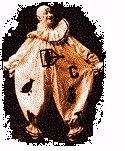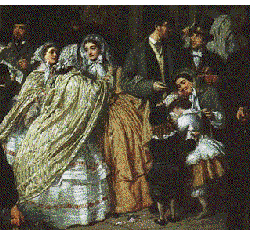
![]()
Feedback - The use of information produced at one point in a series of operations as input at a subsequent point. Feedback enables a system to monitor its own actions and take steps to correct itself.
The Fenian Society - An Irish-American revolutionary secret society
active between 1863 and 1870. The society had operatives in all parts of the world, Australia and South America as well as the
U.S., Ireland, Canada, and Great Britain.
![]()
![]() The rise of Fenianism
The rise of Fenianism
![]()
![]() Young Ireland, Fenianism, and Chartism
Young Ireland, Fenianism, and Chartism
Firestorm - An atmospheric phenomenon, caused by a mammoth fire, in which the rising column of air above the fire draws in strong winds often accompanied by rain. First observed during World War II, when firestorms resulted from air-raids on Dresden and Tokyo.
George Augustus Frederich Fitzclarence (1794-1842) - First Earl of Munster, the oldest son, by Mrs. Jordan, of William the IV, and half-brother of Queen Victoria. Created a peer in 1831, he was supposed to have influenced his father against reform.
 George Washington Lafayette Fox(1825-1877) - Actor and theater
manager, the greatest American exponent of classical pantomime, sometimes called "the American Grimaldi."
Born to a family of mediocre rural actors, he was, at the height
of his popularity, the highest-paid entertainer in America. His
best-known plays include Humpty Dumpty (1868) and Hiccory
Diccory Dock (1869). His increasingly erratic behavior
-- he once ran into an auditorium and attacked members of the
audience without provocation -- ended his performing career.
George Washington Lafayette Fox(1825-1877) - Actor and theater
manager, the greatest American exponent of classical pantomime, sometimes called "the American Grimaldi."
Born to a family of mediocre rural actors, he was, at the height
of his popularity, the highest-paid entertainer in America. His
best-known plays include Humpty Dumpty (1868) and Hiccory
Diccory Dock (1869). His increasingly erratic behavior
-- he once ran into an auditorium and attacked members of the
audience without provocation -- ended his performing career.
French letter - Slang for condom, from about 1870. The English also, but less commonly, attributed the condom to the Americans, Italians, and Spanish. In France, it was called une capote anglaise.
 Frith, William (1819-1909) - British painter of panoramic scenes
of Victorian life, such as the well-known "Derby Day."
Frith, William (1819-1909) - British painter of panoramic scenes
of Victorian life, such as the well-known "Derby Day."
![]()
![]() Frith's The Railway Station
Frith's The Railway Station
Fukuzawa Yukichi (1835-1901) - Prominent educator, writer, and
propagator of Western knowledge during the Meiji era. Starting
in 1854, he studied Western gunnery in Nagasaki, then Western
science and Dutch in Osaka. In 1858, he visited the foreign community
in Yokohama. He joined the first Japanese mission to the United
States, 1860, and the first mission to Europe, 1862. Returning
to Japan, he published Conditions in the West, a hugely
popular book that established his reputation as an authority on
the West. A member of the Meirokusha and founder of Keio University,
Fukuzawa devoted his life to educating the Japanese people to science,
Western ways of thought, and the spirit of independence,
and championed the cause of women. He saw the Japanese as becoming
an Asian version of Great Britain, secure from the threat of Western
attack and exploitation. Although he never accepted a government
post, he had, by the time of his death, become a revered national
figure, one of the founders of the new Japan. A great coiner of
new words to reflect Western ideas, he was probably both the originator
of the phrase "Civilization and Enlightenment" and its
most successful populizer.
![]()
![]() The Dead Fukuzawa Society
The Dead Fukuzawa Society
![]()
The Difference Dictionary was first published
in slightly different form in Science Fiction Eye, Issue #8.
Text copyright 1990, 1996, 2000, 2003
by Eileen K. Gunn.


